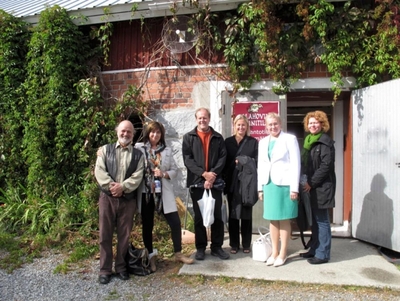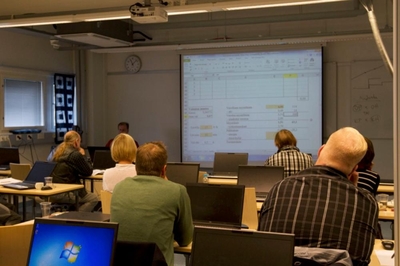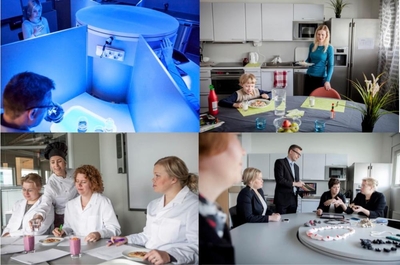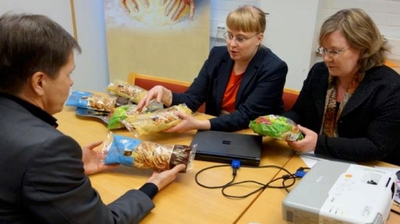The first year of the TRADEIT project
by Helena McMahon
The first year of the TRADEIT project has been a period of intense activity. The 9 Hubs have been established and the associated sub-networks activated at a regional level creating awareness of the supports and offerings available to traditional food producers and researchers. Once of the first activities rolled out at each of the Hubs was a need and barriers analysis in which the Hub Advisors engaged with food producers, developed a company profile and discussed in detail their business and technology needs. Over 320 companies participated ...
The first year of the TRADEIT project has been a period of intense activity. The 9 Hubs have been established and the associated sub-networks activated at a regional level creating awareness of the supports and offerings available to traditional food producers and researchers.
Once of the first activities rolled out at each of the Hubs was a need and barriers analysis in which the Hub Advisors engaged with food producers, developed a company profile and discussed in detail their business and technology needs. Over 320 companies participated and the findings varied across the 9 Hubs and sectors. However, overall they key areas identified as requiring support included shelf life, ingredient sourcing, waste management, pricing strategies, labelling, marketing, access to information, a skilled work force and food safety.
In response, workshops addressing identified topics have been hosted at regional level (labeling, food safety, pricing strategies) using the case study approach with presentations from local food companies (success and failures). These have been really well received and this approach that will be continued in the next series of workshops.
A variety of other activities have taken place including a Craft Bakery Brokerage event, which brought bakery SMEs, and technology providers together to network, explore emerging trends and develop partnerships and the 1st Entrepreneurial Summer Academy for food researchers took place in Ireland. There has been extensive dissemination and stakeholder engagement with activities including 4 newsletters, conference participation, research agenda workshops and development of a new SME magazine for food producers, which will be launched in the coming weeks. The TRADEIT Marketplace is actively sourcing and promoting technologies, experts and partnership opportunities.
Year 2 of the project will be event and activity rich with 5 Brokerage Events across Europe, an extensive program of workshops and the 2nd Entrepreneurial Summer Academy (call to launch in Dec 2014). Local Hub Advisors are available to discuss supports and forthcoming events. Please get in contact as the project teams and experts are available to support your business.
 |
|
 |  |
International Week
Feb 10-12 Kuopio, Finland
The Savonia University of Applied Sciences cordially invites you to a “International Week”, taking place on February 10 - 12, 2015 at Kuopio, Finland
This is your opportunity to visit our campuses and meet with teaching and administrative staff of our university and other international services providers from our networks. Enrollment starting September 1, 2014 but we hope that you mark the date to your calendar now as we know how busy you are!
For further information please visit the website
Programme of Events [Click Here]
More Information [Click Here]
We hope to see many of you at our “International Week”!
Sustainability for small food producers Conference and Brokerage Event
March 26-27, 2015, Cologne, Germany
Upcoming events at the Irish Hub
Are you a small food producer in the Dairy, Meat or Bakery sector who would like practical, relevant training to help increase the competitiveness and sustainability of your business?
We are providing free training in the following areas over the next six months (with more to come in 2015/2016):
- Food safety and quality
- Competitiveness, cost models and pricing strategies
- Food labelling and marketing
- Supply chain management and distribution
More information can be found on the TRADEIT website
Entrepreneurial Summer Academy
 |
We would like to invite you to apply for a place at the TRADEIT Entrepreneurial Summer Academy.
The TRADEIT project is an EU funded multidisciplinary, multi-sectorial collaborative project supporting a Network of Traditional Food SMEs and Food Researchers in the areas of Collaboration, Innovation, Entrepreneurship, Knowledge and Technology Transfer to increase the competitiveness and inter-regional advantage of Traditional Food Producing SMEs.
This is a unique opportunity to take part in a commercially focused three day intensive entrepreneurial training programme for those engaged in and managing Food Research. Completing the Academy will provide the participants with the knowledge to develop their entrepreneurial and innovative mindset (and that of their Research Centers and Teams) and the skill set to deliver research outputs to the marketplace.
More information can be found on:
Entrepreneurial Summer Academy - Research Manager
Entrepreneurial Summer Academy - Post Graduate Researcher
|
 |  |
|
Long term relationships - a ground for active SMEs participation
In Finland, TRADEIT project partner Savonia’s TRADEIT advisors are actively supporting a traditional food producer SME network, located predominantly in Kuopio city area of Finland. Savonia UAS has built close relationships with these regional enterprises utilizing the Open Innovation Space learning OIS-model for SME support.
Localising the training modules for the Finnish SME Network
The TRADEIT project is designed to facilitate knowledge transfer in response to the specific needs of SMEs at ...
In Finland, TRADEIT project partner Savonia’s TRADEIT advisors are actively supporting a traditional food producer SME network, located predominantly in Kuopio city area of Finland. Savonia UAS has built close relationships with these regional enterprises utilizing the Open Innovation Space learning OIS-model for SME support.
Localising the training modules for the Finnish SME Network
The TRADEIT project is designed to facilitate knowledge transfer in response to the specific needs of SMEs at a regional level. In Finland the process involved a needs and barriers analysis and site visits with the food producers to identity the particular needs of the SMEs in the region. The Savonia knowledge transfer team (figure 1) responded via the development of workshops by selecting and localising the content of the 4 training modules themed on Food Safety, Labelling and Marketing, Supply Chain Management, Competiveness and Pricing Strategies to specifically address the priority items for the Finnish enterprises. One such example is the inclusion of the new OIVA system in case of Food Safety issues.

Figure 1. In the middle of August, Dr. Catherine Halbert visit at Future Food Hub Finland was the most useful for developing further all the training modules before their delivery. In the photo, from left to right: one Tradeit entrepreneur Risto Hallman, Dr. Catherine Halbert, the trainer, M.Sc. Kai Selander (module 2), the trainer, M.Sc. Sirpa Vauhkonen (module 3), the hub advisor, Dr. Anna-Maria Saarela and the trainer, M.Sc. Mari Vartiainen (module 4).
Interactive practical action learning sessions for TRADEIT SMEs
The four modules were delivered via an interactive action learning base approach which enabled the participant food producer to shared their experiences, discuss common problems, successful approaches and develop potential solutions (Figure 2). The feedback from the companies has been positive, both on the content and support provided and in particular on the networking possibilities opportunities that presented. The SMEs have requested additional sessions, which will take place early in 2015.

Figure 2. Interactive action learning session: Competitiveness, cost models and pricing strategies for the traditional food sector by trainer, M.Sc. Kai Selander was held on the 8th of October with 12 SME participants.
Consumer-oriented product development
Savonia University of Applied Sciences via the Future Food Hub provides a wide range of product consumer orientated product development services and facilities such as the food test lab, pilot food production lab and an adjustable consumer research lab which can be transformed from a home kitchen, to restaurant, to a 7-people individual evaluation space or to a consumer panel round table with multifunctional observation possibilities (Figure 3). The Hub specialises in product development services such as idea generation, prototype development, product optimisation, chemical and microbiological analysis, sensory evaluation by specialist and consumer panels, marketing and launching products.
Find more information on:
Future Food Hub services:
FOOD – product development services
FOOD – consumer research services

Figure 3. Adjustable Future Food consumer panel room can be transformed from home kitchen to restaurant and from 7-people individual evaluation space to consumer panel round table with multifunctional observation possibilities.
Unique real-life data collection approach available for improving SMEs’ product sales
An internationally recognized consumer research method called Verbal Analysis Protocol combined to Wireless Audio-Visual Observation in real life settings (VAP-WAVO) is a support offering availabel to the TRADEIT SME Network via the Future Food Hub in Savonia. The approach represents a useful technique to enable consumer input to direct innovation in consumer-oriented product development for companies’ needs. This novel approach was successfully applued by a bakery, Trube Ltd. has increased sales of cinnamon bread 88% and butter bread 22%. (Figure 4) During the TRADEIT project, the Future Food Hub will deliver the module consumer-led product development strategies for traditional foods which also describes several other approaches how to utilize consumers in SMEs product development. The main aim of the Future Food Hub is facilitate entrepreneurs, educators, scientists, innovators and consumers to work together more closely than ever by using innovative approaches to create new value for the whole food chain.

Figure 4. According to consumer-oriented data collected in the field by using the novel approach, one bakery called Trube Ltd. has increased sales of cinnamon bread 88% and butter bread 22% stated by the director of the company Mr. Jarmo Tolvanen in the photo with hub advisor Dr. Anna-Maria Saarela and principal lecturer Anja-Riitta Keinänen.
Those interested in participating in the consumer led product development workshops should contact Dr. Anna Maria Saarela at anna-maria.saarela@savonia.fi. *) Saarela A-M, Kantanen T, Lapveteläinen A, Mykkänen H, Karppinen H, Rissanen R. Combining Verbal Analysis Protocol and Wireless Audio-Visual Observation to Examine Consumers’ Supermarket Shopping Behavior. International Journal of Consumer Studies. doi: 10.1111/ijcs.12022, 2013.
 |
|
 |  |
The Research Needs and Barriers to Innovation facing small traditional food SMEs
by Brian McKenna
Following a series of consultation workshops in which the research needs and barriers to innovation of traditional food SMEs, it was very apparent that, unless an SME was encountering a very specific technological problem, little thought was given to research needs. Indeed, while most wished to expand their businesses and engage in product innovation, the barriers could be listed as ...
Following a series of consultation workshops in which the research needs and barriers to innovation of traditional food SMEs, it was very apparent that, unless an SME was encountering a very specific technological problem, little thought was given to research needs. Indeed, while most wished to expand their businesses and engage in product innovation, the barriers could be listed as: - Lack of time for adequate innovation;
- Difficulties of access to finance for innovation;
- The unsuitable size and cost of new processing equipment for delivering product innovations;
- Problems in creating adequate distribution networks;
- The problem of innovation awareness
It quickly became apparent that the needs were as much in the human and organisational sciences as in the technological and physical sciences. Indeed, from other Strategic Research and Innovation Agendas such as that of the European Technology Platform Food for Life, it can seen that the problem of innovation awareness is one of the most critical. Many SMEs do not have the scientific resources to readily access novel technological developments and even where this is not the case, they are too burdened with day-to-day management issues in their enterprises to devote sufficient time to innovation. This confirms the earlier statement that human and organisational barriers dominate the area.
However, there are many scientific issues that are of concern to SMEs as they embark on the innovation journey. Food safety, with its own set of regulatory barriers, must be addressed. Likewise, sustainability issues must be addressed if a profitable development is to be achieved. Finally, consumer issues must be fully understood, especially since food product innovation has traditionally had a very low success rate. Language issues become equally important here since, while basic outcomes such as the continuing changes in eating habits across Europe can be understood, the language used by food scientists, consumer scientists and SME managers is not necessarily the same and a very close dialog between all three is essential for success.
As the development of the TRADEIT Strategic Research and Innovation will be progressing in stages over the coming 8 months, SMEs are invited to contribute by submitting to the project team short details of either a specific technological issue they may be experiencing and which could benefit from research or any barrier to innovation, no matter how small, they may feel that they are facing. Suggestions should be sent to either Brian McKenna or Jeroen Knol
 |  |
TRADEIT Inspire Baking Innovation in Potsdam
On November 6th and 7th over one hundred bakers, suppliers, researchers and experts from across Europe gathered in Potsdam for the TRADEIT Bakery Technology Brokerage event. The turnout was especially heartening as participants had to overcome travel problems caused by a strike on the main railway system.
The aim of the event, hosted by ILU (Institut für Lebensmittel- und Umweltforschung e.V), was to provide SME Bakers with an opportunity to ...
On November 6th and 7th over one hundred bakers, suppliers, researchers and experts from across Europe gathered in Potsdam for the TRADEIT Bakery Technology Brokerage event. The turnout was especially heartening as participants had to overcome travel problems caused by a strike on the main railway system.
The aim of the event, hosted by ILU (Institut für Lebensmittel- und Umweltforschung e.V), was to provide SME Bakers with an opportunity to learn about and adopt the latest technologies from European research. It mixed formal presentations and discussions with both formal and informal opportunities to discover and investigate adopting new technologies.
The event had a full programme of speakers covering future trends in Bakery and the latest in product development. This was followed by a chance to sit down with experts and technology providers to explore the ways in which these technologies could help their businesses. There are already some new partnerships springing up between European partners which have the potential to dramatically change those businesses.
Participant feedback has been very good, with some strong new international relationships forming. The opportunity to learn that the same challenges and opportunities face bakery businesses across Europe was particularly valued. The TRADEIT Project teams are now looking forward to helping those bakeries profit from their new ideas and contacts.
The event closed with a unique event – a hands-on international bakery session in which participants worked together to produce a range of breads and cakes. As much as any of the formal meeting proceedings, this enabled bakers to come together and form new international relationships.
This was the first of series of such events. The next will be a Sustainability themed event, open to all TRADEIT participants, and held alongside the Anuga Foodtech exhibition in Cologne in March. If you would like to participate contact your nearest TRADEIT Hub through the contact page on this website.
 |
|
|
|